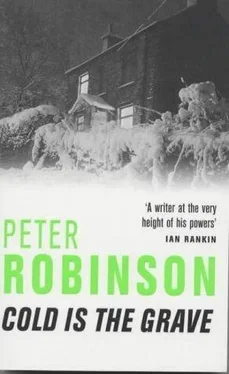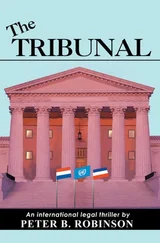“That just about sums it up. Either way you look at it, somebody killed her. But that’s your realm, isn’t it? Ah, here come the cosmonauts.”
Banks looked up and saw the SOCOs entering in their white protective overalls.
“I’ll arrange for the mortuary wagon,” said Dr. Burns. “I’d better tell them they’ll probably need a crowbar to prize her out of there. And I’ll get in touch with Dr. Glendenning first thing in the morning. Knowing him, he’ll have her opened up by lunchtime.” He stood, but paused a moment before leaving. “Did you know her, Alan? You seem to be taking this very much to heart.”
“I knew her slightly,” said Banks. “I might as well tell you now. You’ll find out soon enough. She’s the chief constable’s daughter.”
Dr. Burns’s reaction was exactly the same as Annie’s.
“And, Doc?”
“Yes?”
“Let’s keep this under our hats for the time being, shall we? The strychnine.”
“My lips are sealed.” Dr. Burns turned and left.
For a moment, Banks stood alone watching the spinning disco lights and listening to mumbled conversations around him. Peter Darby came out of the toilet and said he’d got what he wanted. The SOCOs were in there taking the place apart, collecting samples for analysis. Banks didn’t envy them the task of working in a toilet; you never knew what you might catch. Vic Manson would soon be dusting for prints, of which he’d probably find as many as the SOCOs would public hairs, and before long the mortuary wagon would come and whisk Emily Riddle’s body off to the basement of Eastvale Infirmary.
All so bloody predictable. Routines Banks had been part of time and time again. But this time he wanted to cry. Cry and get rat-arsed. He couldn’t help but remember Emily’s excited talk about her future that lunchtime, about how she didn’t fancy Poughkeepsie or Bryn Mawr because of the sound of their names. He remembered the time she turned up at the hotel in London, passing herself off as his daughter, how her dress slid to the ground and he saw her white and naked. Remembered her stoned, adolescent attempt at seducing him. God, if only she knew how close she’d come. Then the way she curled up in the fetal position like a little child on the bed, her thumb in her mouth, the blanket covering her, while he sat in the armchair smoking and listening to Dawn Upshaw sing about sleep and the windows rattled and the winter sun rose and tried to claw its way through the gray, greasy clouds.
Dead.
And perhaps because of him, because he had respected his vow of discretion and done nothing, despite all his misgivings.
Annie came over from the table where she had been talking to Emily’s friends. Banks told her what Dr. Burns had said about strychnine. Annie whistled. “Learn anything over there?” he asked.
“Not a lot. They say she seemed a bit high when she arrived at the Cross Keys, and they’re certain she took something here the first time she went to the toilet.”
“Same as Darren says. Can’t have been the same batch, though, can it?”
“I suppose not. Do you believe them?”
“For the most part. Maybe we’ll lean on them a bit harder tomorrow. What it looks like is that the first time she snorted made her feel ill shortly afterwards, so she went back for more and the convulsions hit.”
“So what now?”
“We can start by searching everyone on the premises. They’re all suspects at the moment, including the bar staff. Can you get that organized?”
“Of course. I very much doubt we’d have any problems arguing reasonable suspicion, do you?”
“I doubt it.” PACE rules stated that you had to have “reasonable suspicion” before searching people, and if you searched them somewhere other than at the police station without first arresting them, you had to have reasonable grounds for assuming they might be a danger to themselves or others. With the chief constable’s daughter lying dead of possible strychnine poisoning only a few yards away, Banks didn’t think they’d have much trouble arguing their case. “Take it easy, though. If anyone kicks up a fuss, take him over to the station and have the custody officer deal with him. I want this done by the book. You’d better let Detective Superintendent Gristhorpe know, too.”
“Will do.”
“I also want all the known coke dealers in the area brought in for questioning. And we’ll need to activate the incident room over at the station.” He looked at his watch. “We might not be able to get everything in order until morning – especially as far as the civilian staff are concerned – but in the meantime we’ll need an office manager.”
“DC Rickerd?”
Banks looked at Rickerd, who was taking a statement at the other side of the club. “Good idea,” he said. “Let him show his mettle.”
While Rickerd demonstrated only minimal detective skills, he had an almost obsessive interest in details and the minutiae of organization: exactly what a good office manager needed, as it was his job to supervise the recording and tracking of all information retrieved both from a crime scene and during an investigation.
If truth be told, you needed more than a skill for organization, but Rickerd would do. Maybe he would find his true métier. Banks knew that having a train-spotter in the department would come in useful one day. Rickerd was just the kind to carry around that little book full of printed train numbers and draw a neat line with pen and ruler through each one he actually saw. He was too young for the steam trains, though. When Banks was a kid, there were still a few of them in service, many with exotic names like The Flying Scotsman, sleek, streamlined beauties. Many of Banks’s friends had been train-spotters, but standing on a windy station platform all day and noting down numbers to cross off later in a little book had never appealed to him. These days, with all the diesels looking like clones of one another, there didn’t seem to be much point in train-spotting anymore.
Banks called Rickerd over and explained what he wanted him to do. Rickerd went off looking pleased with himself to be given such responsibility. Then Banks lit a cigarette and leaned against a pillar. “I’d better go tell her parents,” he sighed.
“One of the uniforms can do that.” Annie put her hand on his arm in a curiously intimate gesture. “To be quite honest, Alan, you look all in. Maybe you should let me take you home.”
Wouldn’t that be nice? Banks thought. Home. Annie. Maybe even bed. The adagio from Concierto de Aranjuez drifting up from downstairs. The clock put back so that none of this had ever happened. “No,” he said. “I’ve got to tell them myself. I owe them that much.”
Annie frowned. “I don’t understand. What do you owe them?”
Banks smiled. “I’ll tell you all about it later.” Then he walked up the stairs to the deserted market square.
Banks felt sick and heavy with dread as he approached Riddle’s house close to one-thirty that morning. The Old Mill stood in almost complete darkness behind the privet hedge, but a glimmer of light showed through the curtains of one of the ground-floor rooms, and Banks wondered if it had been left on as a means of discouraging burglars. He knew it hadn’t when he saw the curtain twitch at the sound of his car on the gravel drive. He should have known Jimmy Riddle would be up working well after midnight. Hard work and long hours were what had got him where he was in the first place.
When he turned the engine off, he could hear the old millrace running down the garden. It reminded him of Gratly Falls outside his own modest cottage. He hardly had time to knock before a hall light came on and the door opened. Riddle stood there in an Oxford shirt and gray chinos; it was the first time Banks had seen him in casual dress.
Читать дальше












